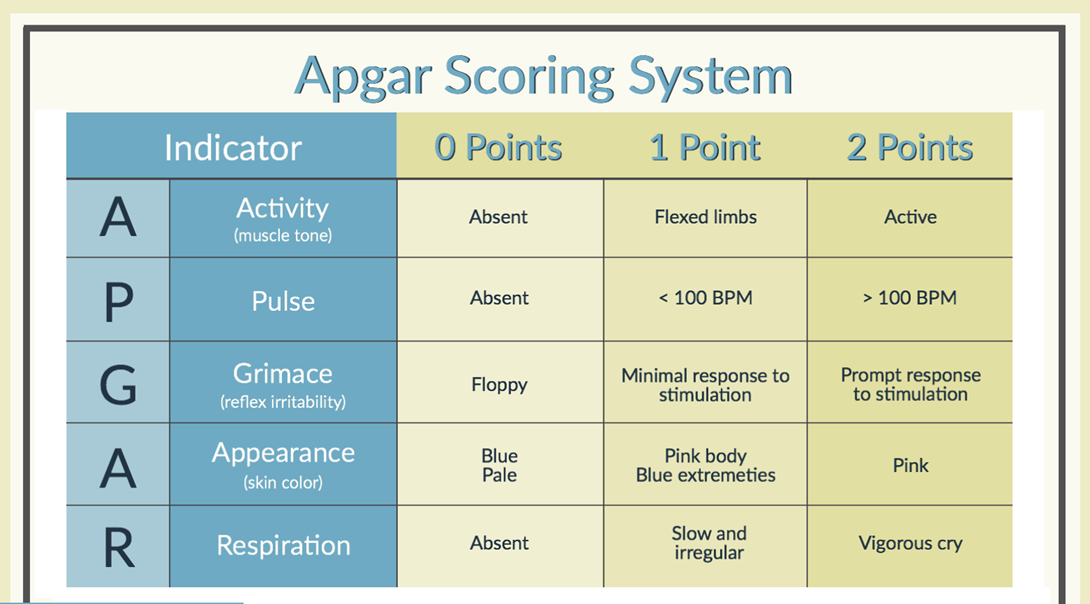The nurse will conduct what assessment on a newborn at 1 minute and 5 minutes after birth?
Apgar score
Blood pressure reading
Head and chest circumference
Respiratory and abdominal assessment
The Correct Answer is A
Choice A reason: This is the best answer. Apgar score is a quick and simple assessment that evaluates the newborn's appearance, pulse, grimace, activity, and respiration. It is done at 1 minute and 5 minutes after birth, and sometimes at 10 minutes if needed. It helps to determine the newborn's condition and need for resuscitation or medical intervention.
Choice B reason: This is not the correct answer. Blood pressure reading is a measurement of the force of the blood against the walls of the arteries. It is not routinely done on newborns, unless there is a suspicion of a cardiac or renal problem. It is usually done after the first 24 hours of life, and then as indicated by the newborn's condition.
Choice C reason: This is not the correct answer. Head and chest circumference are measurements of the size and shape of the newborn's head and chest. They are done once within the first 24 hours of life, and then as indicated by the newborn's condition. They help to monitor the newborn's growth and development, and to detect any abnormalities or asymmetries.
Choice D reason: This is not the correct answer. Respiratory and abdominal assessment are examinations of the newborn's breathing and digestion. They are done once within the first 24 hours of life, and then as indicated by the newborn's condition. They help to evaluate the newborn's lung and bowel function, and to identify any signs of distress or complications.

Nursing Test Bank
Naxlex Comprehensive Predictor Exams
Related Questions
Correct Answer is C
Explanation
Choice A reason: This is a partial answer. It is helpful in understanding client actions, but it is not the main reason for nurses to understand growth and developmental stages.
Choice B reason: This is a vague answer. It provides important background information, but it does not explain how that information is used in nursing practice.
Choice C reason: This is the best answer. It helps in planning interventions that will result in best outcomes, because it allows the nurse to tailor the care to the client's specific needs, abilities, and expectations based on their stage of growth and development.
Choice D reason: This is a weak answer. It is important to teach the client about what stage they are in, but it is not the primary reason for nurses to understand growth and developmental stages. Teaching the client about their stage of growth and development may be one of the interventions that the nurse plans, but it is not the goal of understanding growth and developmental stages.
Correct Answer is C
Explanation
Choice A reason: This is a harmful action that will not strengthen the client's self-concept. A sedentary lifestyle may lead to physical and mental health problems, such as obesity, diabetes, depression, and low self-esteem. The nurse should encourage the client to adopt a healthy lifestyle that includes physical activity, nutrition, and rest.
Choice B reason: This is an ineffective action that will not strengthen the client's self-concept. Closed-ended questions and statements are those that can be answered with a yes or no, or a short response. They do not allow the client to express their thoughts, feelings, and opinions. The nurse should use open-ended questions and statements that invite the client to elaborate and share their perspective.
Choice C reason: This is the best answer. Effective coping skills are those that help the client to manage stress, emotions, and challenges in a positive and adaptive way. They include relaxation techniques, problem-solving strategies, social support, and positive self-talk. The nurse should encourage the client to use these skills to enhance their self-concept and well-being.
Choice D reason: This is a counterproductive action that will not strengthen the client's self-concept. Avoiding discussing the client's fears or anxieties may make them feel isolated, misunderstood, or ashamed. The nurse should create a safe and supportive environment where the client can openly discuss their concerns and receive empathy and guidance.
Whether you are a student looking to ace your exams or a practicing nurse seeking to enhance your expertise , our nursing education contents will empower you with the confidence and competence to make a difference in the lives of patients and become a respected leader in the healthcare field.
Visit Naxlex, invest in your future and unlock endless possibilities with our unparalleled nursing education contents today
Report Wrong Answer on the Current Question
Do you disagree with the answer? If yes, what is your expected answer? Explain.
Kindly be descriptive with the issue you are facing.
